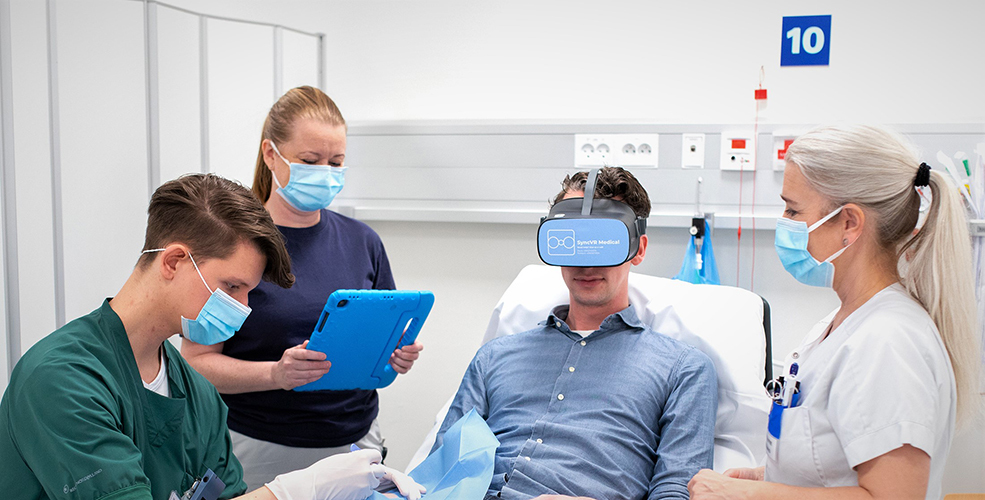Over the last ten years, the use of virtual reality (VR) headsets for the management of (chronic) pain in patients has gained traction. In 2021, the U.S. Federal Drug Administration authorized the use of an immersive VR system as a treatment against chronic lower back pain, based on the favorable effects seen in a randomized, double-blinded clinical study. Functional magnetic resonance imaging (fMRI) studies also indicate that brain activity associated with acute pain perception is reduced when participants are immersed in a virtual world.
Medical Oncologist Nicolien de Clercq became fascinated by these observations and wanted to see if cancer patients at Amsterdam UMC could benefit from exploring virtual realities that are specifically developed to reduce pain perception.
As the winner of the Cancer Center Amsterdam Clinical Publication Award 2022, she put the prize money to good use: the purchase of VR headsets from SyncVR.
A memory reset for pain perception
“Normally, when we feel pain - caused by an injury for example - our brain’s limbic system receives and processes stimuli from the wounded area in our body,” says Nicolien. This limbic system, including the amygdala and hippocampus, plays an important role in the emotional-affective dimension of pain perception. Naturally, patients with cancer are very focused on body regions affected by the tumor. It is believed that this alertness can turn the ‘memory and anxiety centers’ in the hippocampus and amygdala into ‘overdrive’ in some patients, which may strongly amplify their pain perception.”
VR is an immersive technology that makes you feel as if you are in another world, with a 360° view of a 3-D virtual world and sounds from a headset. The basic idea behind the application of VR to reduce pain is that this immersive virtual world can reshape negative association patterns involving awareness of the tumor and feelings of anxiety, stress, and depression, all of which influence pain perception, according to Nicolien.
“The VR headset functions in the manner of cognitive behavioral therapy - patients are distracted from focusing on their pain by entering a calming virtual world. They learn to control their anxiety and consequently their pain patterns. In this way, VR seems to create a reset of the brain’s memory and anxiety centers and ‘takes the sting out of it’, so to speak,” explains Nicolien.
“So far, our experience with the VR headset in oncological pain management is still very limited – the project is still at an early stage. However, we’ve seen some very encouraging results. For example, one woman with breast cancer - this is our most successful example - the VR headset seems to have changed her life completely. She was experiencing severe pain after radiation treatment. But with VR, she was able to stop taking opiates and even resume her work.”
Next steps into VR applications for oncological pain management
Together with professors Monique Steegers and Lia van Zuylen and Robbert Brouwer, the founder of SyncVR, Nicolien is working on getting funding to take the novel strategy to the next level and develop evidence-based treatments. “We see a lot of potential for the use of VR pain management in curative and palliative oncological care. What we need to do is initiate hypotheses-generating pilot studies with patients experiencing oncology-related pain and determine whether VR glasses provide added benefits on top of the standard treatment. Next, we would like to really put the VR headset to the test in a larger randomized study, in which the impact of oncological pain management with a VR headset can be assessed objectively.”
Dr. Nicolien de Clercq has just successfully completed her training in Medical
Oncology. Before taking VR applications for oncological pain management to the
next level, she will take a 6-month sabbatical in which she will immerse
herself into the real world, visiting the continents of Asia and North America.
For more information, contact Nicolien de Clercq.

Image: VR in the clinic. Photo provided by Robbert Brouwer, SyncVR.
This article was created for Cancer Center Amsterdam.
© 2023 NHBC – All rights reserved.

